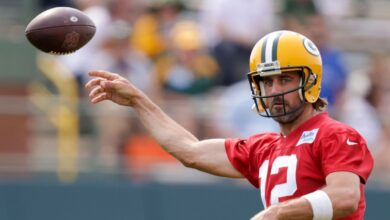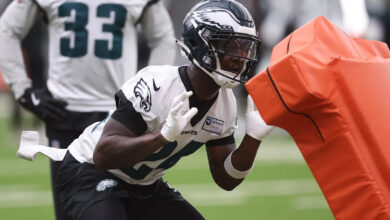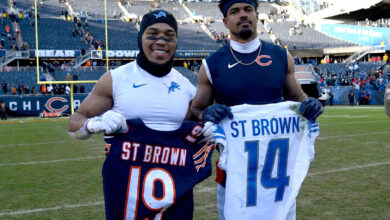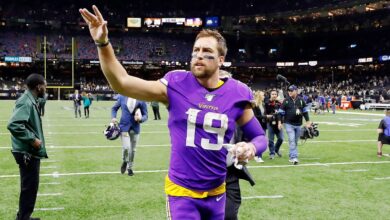Why Osa Odighizuwa wants to advocate for mental health
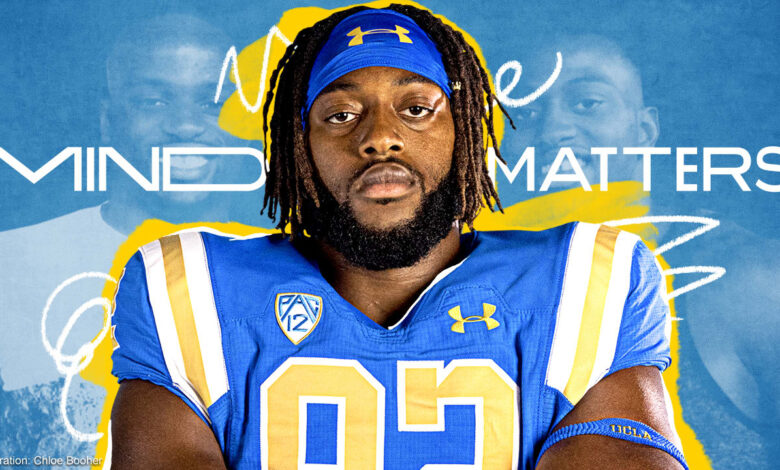
With a lifetime of experience as an engaged listener, Osa wouldn’t mind being the player his new Dallas Cowboys teammates can go to in times of personal crisis. He wants to be this player in part because he knows his brother either didn’t have such a teammate when he was with the Giants, or at least didn’t feel like he knew who that teammate was. At the same time, he also understands that maintaining such a status within an NFL locker room is best paired with on-field success.
“I’ll be someone people can confide in in a judgment-free space, while also remaining my positive self,” he said. “I would want teammates to feel like they can come to me with a problem and know I will listen and be there without judging anyone.”
In a league of more than 2,100 players, it’s easy to be dismissive about how much impact one single player can have. But focus groups gathered by the NFLPA suggest players are increasingly more willing to discuss mental health issues, and that small groups like the one-on-one settings Osa is willing to engage in are where positive breakthroughs usually happen.
The NFLPA considers team clinicians to be the first option to whom players can turn, but not all want to go there. The second option offers up to eight free sessions with a counselor, covered under the health insurance provided to active players, from an NFLPA-vetted list of clinicians that is password-protected for players only on the NFLPA’s web site.
“Some of the barriers are, If I use my team clinician, where is that information going? Of course, team clinicians, we value them and they value their duty legally and ethically to confidentiality, but players sometimes don’t necessarily trust the system they’re in,” said Dr. Amber Cargill, the NFLPA’s Director of Player Wellness. “So, there’s a big fear around, If I use my (team) clinician, and it’s known that I use my clinician, is that going to be a red flag or used against me in some way?“
Owa was complimentary of the resources both the Giants and the NFLPA had in place for players to seek a mental health checkup and acknowledges he should’ve taken better advantage. The barriers that prevented him from seeking more timely help were common ones. First, he didn’t even realize his mental health was being compromised. And even though he recognized that something wasn’t right with his mental state, he had a determination — frequently born of the stigma surrounding mental-health issues – that he could get through it by himself. In a hyper-masculine NFL locker room environment, that sort of determination is nothing unusual.
“I didn’t know the name of what this feeling was, but I was an athlete,” Owa said. “I was used to pushing through things, thinking: I can navigate this. I was just trying to shove it all away. But it got to the point where I couldn’t muscle through it anymore. It caught up with me.”
It’s that mentality Osa hopes to help end by fostering, as much as one NFL player can, a culture of openness in Dallas on the subject of mental health. And unlike his older brother, Osa won’t be so reticent to express himself.
“I’m an open book. If something doesn’t feel right to me, at any point, I’m calling family just so they know what’s up with me,” Osa said. “The emotions, I’m not going to lie and say I’m not a little bit of a bottler when it comes to emotions, but I have football — that’s my outlet for emotions. But I still get things off my chest and talk with people about whatever it is on my mind.”
Stigma surrounding mental health problems, of course, goes way past the NFL locker room. The inherent determination to overcome such issues alone, so that one doesn’t have to expose emotional vulnerabilities, has deep traditional and cultural roots that aren’t easily replaced. The mental health class Osa took at UCLA stuck with him on multiple fronts, from recognizing symptoms to understanding that problems don’t all arise from external stress; that chemical imbalances in the brain can cause mental illness, as well.
One of the many things he took away from the course was that he can make a difference. Still, ending the stigma in the NFL isn’t just a player-to-player challenge; the culture within an NFL club can play a role as well, according to Cargill.
“You may have a group of players more willing to engage, but if they don’t feel the club culture is permissive of that, then you’re going to be stuck in the same stigma,” Cargill said. “And vice versa — if you have a group of guys not willing to go there, but you have a club culture that is willing, the stigma is still going to be there. It’s an interaction of the two that needs to be on the same page.”
Source link

